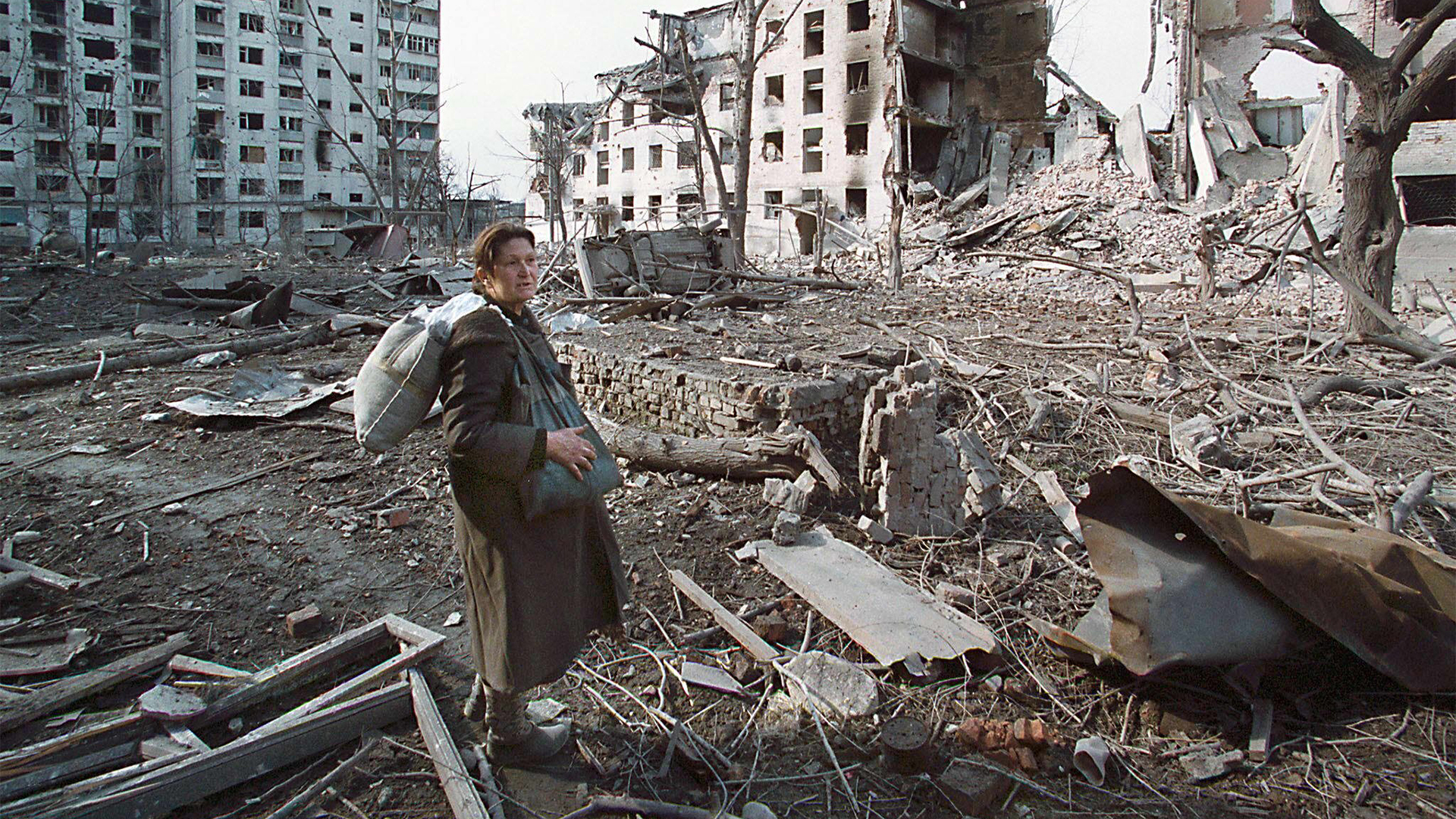World
Ukraine war: Kyiv and the „Grozny scenario”

Status: 03/03/2022 2:52 PM
Is the Russian army doing a similar action in the battle of Kyiv as in the Chechen wars and bombing the city heavily? Many residents fear this, and a military expert sees the Russian Army in a tactical dilemma.
The Russian president made it clear what was self-evident and there was no reason to contradict it. Vladimir Putin said in 2004 after a flight over the Chechen capital that Grozny looked „simply appalling”. Russia has declared the end of the second war against separatists in the Caucasus, and Putin has surveyed a city that has become a modern symbol of the Russian war. What the residents of Grozny suffered can now threaten also the residents of Kyiv and Kharkiv, and this is not only feared in Ukraine.
After two wars, Grozny was largely destroyed. During the first Chechen war in 1994/1995 the Russian army besieged the city for weeks and bombarded it with artillery for days. Russian forces also attacked the city from the air. It is estimated that 25,000 people died.
In the second shortest Chechen war since mid-1999, the city was again attacked from the air and artillery and captured by Russian forces in the early 2000s. In 2002, the United Nations ranked Grozny as the worst-hit city in the world.
Uwe Halbach, an expert on Caucasus affairs, says the consequences for the civilian population were „devastating during the massive stages of the war”. Take the two wars together, the death toll is estimated to be between 100,000 and close to 200,000 people. Thus, according to Halbach, „the Chechen wars constituted the worst violent event in the post-Soviet region.”
Grozny 1995: Fighting between the Russian army and separatists reduced the city to rubble.
Photo: Photo Alliance / d
’brutal approach’
Will the people of Kyiv now have to adapt to this scenario? „The Russian armed forces are primarily an artillery army,” says Vienna military analyst Franz-Stephan Gade. The Russian military relies on „firepower” which – along with air strikes and large-scale bombing – aims to intimidate the population and clear the way for its forces. Gadi fears that this „frontal and brutal approach” will appear in Kyiv.
The Russian army is primarily interested in avoiding a long battle in the city, he analyzes – here memories of the Chechen wars, as well as the Georgian war in 2008, also play a role on the part of the attackers.
helpless as in Afghanistan
In Chechnya, the Russian army showed itself to be very vulnerable to the guerrilla tactics of Chechen fighters in the first war. „As in Afghanistan, the Russian army was hardly able to fight between the partisans,” recalls Uwe Halbach. In the second Chechen war, from 2001 on, they increasingly handed over the fight against separatists to the local armed forces led by the Kadyrov clan.
Gadi says that in 2008 he showed a serious inability to manage battles, security of communications, and communication between individual units – at times the smaller Georgian army was superior to the Russian armed forces. In the end, they „overpowered the bulk of the Russian armed forces.”
The superiority in arms and soldiers did not prevent the Russian army from experiencing serious problems in Chechnya and Georgia.
Photo: Photo Alliance / d
Problems still exist
Military observers are aware of some of these problems—to their surprise—so far in the Ukraine war. Ex-NATO General Hans Lothar Domrose Difficult but fair About the fact that at the beginning of the war not all branches of the armed forces were widely coordinated and deployed.
Military analyst Gadi is also surprised that the army has shown itself to be „relatively weak” in the „combined arms battle” and appears to have „learned no more lessons” from past wars. There are indications that the military has no experience in „urban” combat as one might expect.
Siege and shoot
From this point of view, Gadi concludes that the Russian armed forces will also choose the brutal approach in Kyiv and develops this scenario: a siege ring could be formed around the city in order to subsequently intimidate the population with targeted bombing and artillery fire. And then it will have the opportunity to leave the city through humanitarian corridors „so as not to completely destroy Russia’s international reputation” – but also to facilitate urban combat.
Western military experts agree that the leadership of the Russian army could not be interested in a long battle inside the city. All the time, the great motivation of the Ukrainians, the shortcomings of the Russian army and the strategic advantage that even inexperienced fighters in a defensive position had, were noted.
Experience has shown that the attacking arm needs up to five fighters for a cannon, in a city like Kyiv, this ratio can rise to ten to one. Jade notes that „Russia simply does not have that many fighters.”
This in turn increases the dilemma of the attacker. Because the Russian army had to rely on increased artillery fire. Destroyed buildings are „complete defenses”. And the will to fight on the Ukrainian side is very high – perhaps because they don’t even know what urban combat really means, which Gadi says is „the most brutal kind of war”.
Chechnya as a deterrent?
Perhaps for this reason, even in the first days of the war, rumors were circulating that the Russian army also wanted to use Chechen units in the fight against the Ukrainians. They have been considered particularly unscrupulous since the two wars.
The French expert on Russia and the Caucasus Jean-Francois Ratel sees no signs of this – he considers such rumors to be part of psychological warfare. The goal is „to make the Ukrainians believe that what happened in Chechnya will also happen in Ukraine: that they will flee in the city, that there will be looting, rape and murder,” the magazine Foreign Policy quotes the French people.
So far, cities have already been bombed, sometimes with cluster munitions. Attempts to capture major cities such as Kharkiv could initially be repelled. But the attacks are growing in intensity, increasingly injuring civilians, while Russia continues to increase its forces.
Thus the Grozny scenario is also one of the many uncertainties and remains part of the guesswork about Russian plans in this war.

„Praktyk żywieniowy. Guru bekonu. Irytująco pokorny entuzjasta zombie. Uczeń totalny”.
World
What tourist behavior bothers Italians the most?

He presses
Many German vacationers will return to Bella Italia in 2024. In order not to attract negative attention from local residents, they should refrain from certain behaviors.
Unfortunately, it is not uncommon for tourists to display bad manners while on vacation. Sometimes it gets to the point that the local government feels forced to take action against them: an example of this is banning entry to geisha areas in the Japanese city of Kyoto after tourists behaved disrespectfully towards the artists. In a small Japanese town near Mount Fuji, a popular photo of vacationers is obscured with privacy gauze because they leave a lot of trash behind and block paths. In Venice, fines are imposed for not wearing a shirt and swimming in the canals because many holidaymakers do not follow the rules.
Nine behaviors that make tourists instantly unpopular in Italy
But sometimes, it doesn’t have to be a huge mistake to attract negative attention from locals while on vacation. Learning platform Prebly He conducted a representative survey of Italians living in Italy to find out which behavior of foreign guests bothers them most. 18% of locals get upset when guests don’t order traditional Italian dishes while on vacation. For 12%, ordering a cappuccino after 12 noon is a no-no. Many also find it impossible when speaking to them in a foreign language.
However, leaders of rude tourist behavior no longer fall into the category of false mistakes. Most locals, 69%, are upset when holidaymakers behave disrespectfully at memorial sites. Noise and leaving garbage behind are also a major source of inconvenience to residents (24 percent).
You don’t want to miss any news and tips about vacation and travel?
Then sign up for the travel newsletter from our partner Merkur.de.
In the overview you will find the nine worst behaviors of tourists to Italy from the point of view of local residents:
- Lack of respect for memorials (69%)
- Noise and littering (24 percent)
- Ordering foreign dishes (18%)
- Order cappuccino after 12 noon (12 percent)
- Addressing local residents in a foreign language (12 percent)
- Ongoing small talk (10 percent)
- Don’t wait to be hired (7 percent)
- Not being able to even say hello or thank you in Italian (5 percent)
Five tips to behave like an ideal tourist in Italy
In Italy, people are accustomed to tourists, but this does not mean that vacationers can afford anything. If you want to show your appreciation or simply want to avoid some mistakes, you can follow the etiquette below Prebly Catch:
- Don’t take holiday selfies in inappropriate places: Monuments and memorials are some of the most visited tourist attractions – but it’s not always appropriate to stand in front of them for a holiday photo. Pay attention to information panels explaining the context of the memorial to determine appropriate behavior.
- No cappuccino in the afternoon: In Italy, after midday is common coffee – Any espresso – I drank. If you order a cappuccino, you are fooling yourself and revealing yourself as a tourist – and someone who has not studied Italian coffee culture.
- Learn basic vocabulary: Locals enjoy when tourists know at least the most important terms in their language. For example Ciao As a greeting or farewell beauty To express gratitude.
- Appreciation of food culture: For many Italians, it is terrifying to see vacationers cutting spaghetti or cutting pizza into small pieces with a knife and fork. Spaghetti is rolled around the edge of the plate using a fork – no spoon – and pizza is traditionally eaten by hand.
- Avoid noise: In Italy there is usually a quiet period between 1pm and 3pm. She calls herself Reposo. During this period, tourists should avoid loud disturbances and act considerately.

„Praktyk żywieniowy. Guru bekonu. Irytująco pokorny entuzjasta zombie. Uczeń totalny”.
World
Residents must leave the city: Israel begins evacuating Rafah before military deployment

Residents must leave the city
Israel begins evacuating Rafah before military action
May 6, 2024, 7:17 am
Listen to the material
This audio version was created artificially. More information | Send your opinion
The Israeli army begins evacuating the city of Rafah, south of the Gaza Strip. The army calls on residents of the eastern part of the city, located on the border with Egypt, to go to Al-Mawasi camp on the Mediterranean Sea, a few kilometers north. Military action is expected.
The Israeli army began evacuating the city of Rafah, south of the Gaza Strip, in preparation for an expected military operation. The army called on residents of the eastern part of the city, located on the border with Egypt, to go to Al-Mawasi camp on the Mediterranean Sea, a few kilometers north.
Indirect negotiations between Israel and the Islamic terrorist Hamas movement in Cairo regarding a new ceasefire in the Gaza war and the release of hostages in exchange for Palestinian prisoners had previously remained unsuccessful. Israel wants to use the military operation in Rafah to destroy the remaining brigades of the Islamic terrorist organization Hamas. There are also suspected hostages in the city on the border with Egypt.
Israel’s allies have been warning urgently for months against launching such an attack in Rafah because hundreds of thousands of displaced Palestinians are gathering there. However, Israel believes that the operation is necessary to ensure the destruction of Hamas’ combat capabilities. Otherwise, it could regain its power after the war ends.
The border crossing is closed
Members of Hamas’ military wing fired rockets at Israel’s Kerem Shalom border crossing on Sunday, killing three Israeli soldiers. Kerem Shalom is considered the main border crossing for delivering aid from Israel to the Gaza Strip. The army temporarily closed the crossing to humanitarian transport after the missile attack. According to his statements, the army then bombed the place in the Gaza Strip near the Rafah border crossing with Egypt, from which the attack was launched.
Before the combat operations in Rafah, Israel said that it wanted to evacuate the city first. This is expected to take several weeks. Israel said that Hamas prepared its fighters in Rafah to deploy against Israel and provided them with supplies and weapons. According to media reports, the number of hostage guards has also been increased.
Ground attack in stages
According to information received from the Wall Street Journal, Israel wants to carry out its ground attack in Rafah in stages. The newspaper wrote about two to three weeks of evacuation and six weeks of attack. Senior Israeli intelligence and military officials met in Cairo last month, among others, with the head of Egyptian intelligence to discuss Israel’s planned deployment of its army in Rafah.
The head of the Egyptian Information Service, Diaa Rashwan, had previously stated that there were no discussions with Israel about its possible military attack in Rafah. Egypt strongly rejects plans for such an attack and has made this position clear several times. The city to the south is the only city on the enclosed coastal strip that remains relatively intact.
Egypt fears, among other things, that the Israeli deployment in Rafah will lead to a rush of Palestinians across the border. The border crossing from the Gaza Strip to Egypt is located in Rafah, and is also an important gateway for the delivery of humanitarian aid to the closed coastal enclave. Intense fighting in Rafah may further complicate deliveries of food, medicine and fuel.

„Praktyk żywieniowy. Guru bekonu. Irytująco pokorny entuzjasta zombie. Uczeń totalny”.
World
Experts suspect the Kremlin is behind the new law

He presses
People in Georgia have been protesting against a government law for weeks. One expert suspects Russian influence behind the project.
Tbilisi – In recent days, Georgia has witnessed huge demonstrations against the law planned by the government. The law stipulates that NGOs that receive more than 20 percent of their funds from abroad must identify the source of the funds and register with the authorities. According to one expert, the Kremlin may be behind the proposed law in Georgia.
Protests in Georgia: Experts suspect the Kremlin is behind the law
Thousands of people protested against the law in Georgia on Friday (May 3) with slogans such as “No to the Russian government” or “We will not tire.” The bill was approved on second reading on Wednesday (May 1). But for weeks, people have taken to the streets and confronted police, who have responded to the demonstrations with tear gas, water cannons and rubber bullets.
Critics accuse Georgia’s Russia-allied government of modeling the law on Russia’s „proxy law.” “In terms of internal politics, there is actually no explanation for this,” Stefan Mallerius, representative of the Konrad Adenauer Foundation in Tbilisi, says in ZDF magazine today. The Georgian government withdrew the “Russian law,” as some called it, in March 2023 after massive protests. For Mallerius, the fact that it will now come into force comes “suddenly.”
Georgia: Law through „foreign interference”
The head of the regional program in the South Caucasus suspects „interference from abroad, specifically from Russia.” “There has to be a connection from the Kremlin or the Kremlin region,” he says. Malerios suspects that Georgian oligarch Bidzina Ivanishvili, who is considered the country’s unofficial decision-maker, is behind the law. Malerius continues to speculate, saying, “He was told or made clear that he had to introduce this law now.” Ivanishvili was the initiator of the inter-party alliance and today’s ruling party, the Georgian Dream.
The law still needs Parliament’s approval on a third reading. This is scheduled to be done within two weeks. Pro-European President Salome Zurabishvili is expected to veto the measure. But pro-government representatives in parliament have a sufficient majority to override the president’s veto. The ruling party aims for the law to enter into force in mid-May. Georgia has been an official candidate for European Union membership since last December. Green Party politician Anton Hofreiter sees Georgia’s accession as being at risk from the law. (FCA/AFP)

„Praktyk żywieniowy. Guru bekonu. Irytująco pokorny entuzjasta zombie. Uczeń totalny”.
-
Tech3 lata ago
Te oferty Apple nadal istnieją
-
Top News2 lata ago
Najlepsze strategie i wskazówki dotyczące zakładów na NBA
-
Tech3 lata ago
Kup PS5: Expert bez nowych konsol – kiedy nadejdą dostawy?
-
Tech3 lata ago
Windows 11 dla programistów: aplikacje na Androida, zestaw gier i pakiet Windows SDK
-
Economy3 lata ago
Huobi Global rozpoczął kampanię zerowej opłaty dla użytkowników kart bankowych w Europejskim Obszarze Gospodarczym i Wielkiej Brytanii
-
entertainment3 lata ago
Dieter Bohlen ogłosił nową pracę w telewizji – to zaskakujące
-
entertainment3 lata ago
„Helene Fischer Show”: Nagłe zakończenie bożonarodzeniowego show – ostre słowa ZDF
-
Tech4 miesiące ago
Ubóstwo CO2 może ujawnić łatwość życia – Wissenschaft.de






